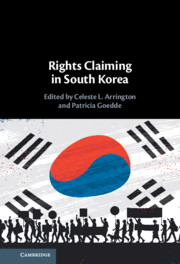Book contents
- Rights Claiming in South Korea
- Rights Claiming in South Korea
- Copyright page
- Dedication
- Contents
- Contributors
- Acknowledgments
- Abbreviations
- Introduction Rights in Action
- Part I Rights in Historical Perspective
- Part II Institutional Mechanisms for Rights Claiming
- 4 A Clash of Claims
- 5 Advancing Human Rights, Advancing a Nation
- 6 The Constitutional Court as a Facilitator of Fundamental Rights Claiming in South Korea, 1988–2018
- 7 Rights Claiming through the Courts
- 8 Public Interest Lawyering in South Korea
- Part III Mobilizing Rights for the Marginalized
- Part IV Shaping Rights for New Citizens and Noncitizens
- Conclusion Findings and Future Directions
- Index
- References
8 - Public Interest Lawyering in South Korea
Trends in Institutional Development
from Part II - Institutional Mechanisms for Rights Claiming
Published online by Cambridge University Press: 17 April 2021
- Rights Claiming in South Korea
- Rights Claiming in South Korea
- Copyright page
- Dedication
- Contents
- Contributors
- Acknowledgments
- Abbreviations
- Introduction Rights in Action
- Part I Rights in Historical Perspective
- Part II Institutional Mechanisms for Rights Claiming
- 4 A Clash of Claims
- 5 Advancing Human Rights, Advancing a Nation
- 6 The Constitutional Court as a Facilitator of Fundamental Rights Claiming in South Korea, 1988–2018
- 7 Rights Claiming through the Courts
- 8 Public Interest Lawyering in South Korea
- Part III Mobilizing Rights for the Marginalized
- Part IV Shaping Rights for New Citizens and Noncitizens
- Conclusion Findings and Future Directions
- Index
- References
Summary
Public interest lawyering in South Korea has emerged as a response to inadequate rights protections. During the democratic transition, Lawyers for a Democratic Society (Minbyeon) was the primary network of lawyers who advocated for civil and political rights, especially on behalf of workers, students, and dissidents. In the 1990s, lawyers increasingly worked with nongovernmental organizations to promote social and economic rights in the areas of labor, consumer advocacy, environmental rights, and gender equality. Most recently, a small number of public interest lawyers’ groups formed to focus on the rights of minorities, such as migrants, refugees, people with disabilities, and sexual minorities. Meanwhile, bar associations, law firms, and law schools have sought to promote pro bono activity as a professional ethic. This article examines the emergence of public interest law entities since the early 2000s to identify patterns in institutional development and sustainability, especially in modeling and diversification. These case studies uncover an increasingly institutionalized infrastructure for legal mobilization in Korea.
Keywords
- Type
- Chapter
- Information
- Rights Claiming in South Korea , pp. 172 - 192Publisher: Cambridge University PressPrint publication year: 2021

